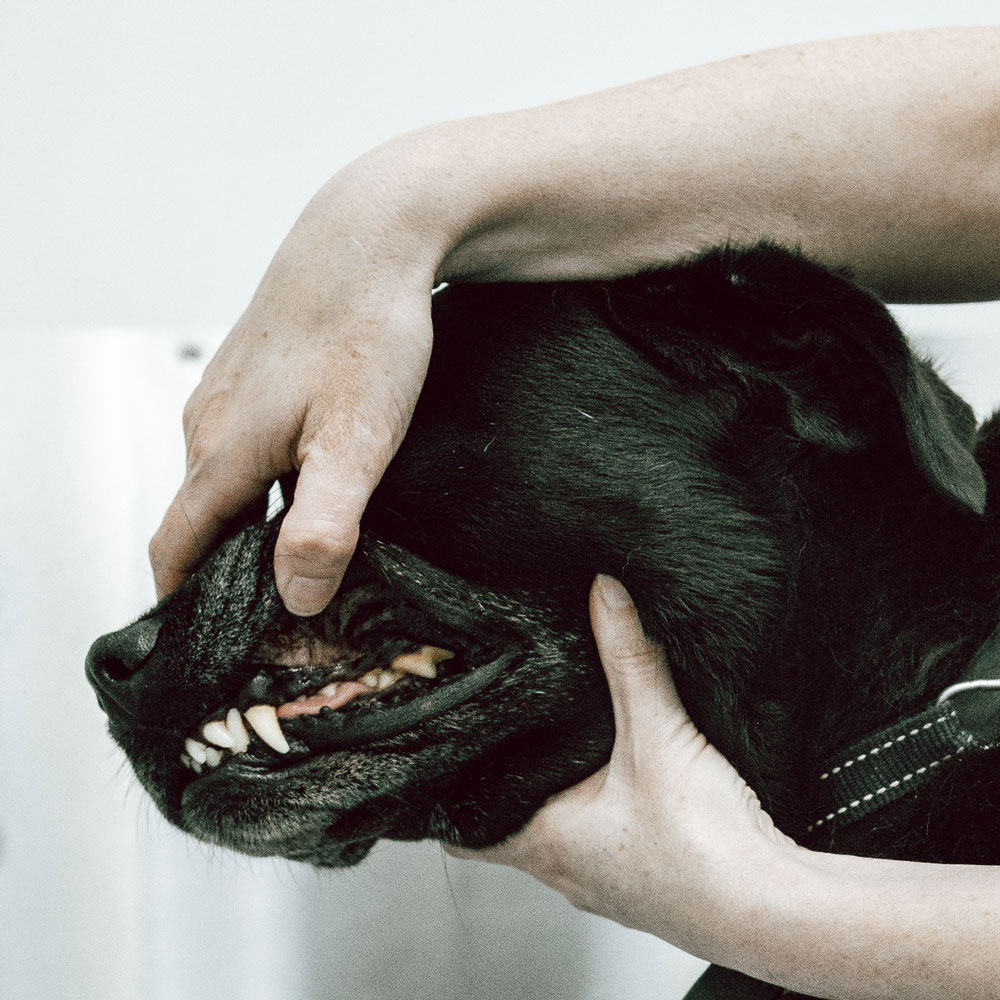Pet Dentistry
at Beach + Bay Vet

Pet Dentistry
Good dental health is very important, not only for your pet’s quality of life and comfort, but also for general health. Same as in people, pet dental disease can have negative effects on other organs, including the kidneys and heart, due to potential for bacteria to enter the bloodstream from an infected mouth.
Often owners are not aware of poor dental health in their pet, as dogs and cats are mostly quite stoic due to basic survival instincts, and will continue eating even if their mouth is sore. However, some owners will have noticed “bad breath”, a brown layer on their pet’s teeth, or sometimes a pet becoming more picky with which foods they will eat.
How do I know if my pet needs dental treatment?
We suggest annual wellness checks on your pet (which can often be combined with yearly vaccinations), where we can check your pet’s teeth as part of the overall exam. This involves looking for signs of dental disease, such as:
- tartar build-up (brown accumulation on the teeth)
- gingivitis (redness at the edge of the gum where it meets the tooth)
- periodontal disease (deeper gum and jaw inflammation, sometimes associated with loosening of teeth, loss of gum, and/or pus)
- any other potential issues, such as a lump in your dog’s or cat’s mouth.
If we notice dental issues in your pet, we will give you an estimate for the appropriate dental treatment based on the appearance of your pet’s mouth. We can then book a suitable morning drop-off time for you to bring your pet for the procedure. The procedure usually requires a day-stay in hospital, with you picking your pet up again in the afternoon or early evening. We will ring you to recommend a time for pick-up when your dog or cat’s procedure is finished.
Does my pet need any preparation for dental treatment?
Pet dental treatment is always done under anaesthetic – it’s just not possible to properly clean below the gumline in a conscious pet. Cleaning below the gumline is essential for proper treatment, as this area is where a lot of plaque and bacteria that cause painful periodontal disease hide!
To safely prepare your pet for the anaesthetic, we ask that you do not give your pet any food from 9pm onwards the night before the booked procedure. Water is OK overnight, but then please take this away early on the morning of the procedure, so your pet arrives to us with an empty stomach. This helps prevent one common anaesthetic risk (vomiting under anaesthetic).
Depending on your pet’s age, we may also make individual recommendations to perform blood tests to check that your dog’s or cat’s liver and kidneys can safely handle an anaesthetic.
What will the dental treatment involve?
If your dog or cat’s dental disease is in the early stages, it may be treated with a simple scale and polish (clean). If disease is more advanced and teeth are permanently damaged, we may recommend some tooth extractions. If required, we can perform dental x-rays to help guide us on these decisions, so we are able to give you the best treatment recommendation for your pet.
Rest assured that if any extractions need to be done, we routinely perform anaesthetic nerve blocks to numb all sensation for several hours after (like a human dentist does!), and will then send your pet home with additional anti-inflammatory pain relief in order to ensure their comfort in the recovery period. If your pet has had large extractions done, we may place gum stitches to close the hole left in the gum – these will dissolve away and fall out on their own in several weeks.
How can I help my pet recover from treatment?
If your pet has had extractions, we will also recommend the following to prevent your pet damaging their extraction sites during healing:
- only feeding your pet soft, chunky food (e.g. cooked chicken breast chunks, or dog roll pieces) for up to 2 weeks post-dental
- not playing any rough games that may hurt your pet’s mouth, e.g. tug toys with dogs, for 3-4 weeks post-dental
- preventing your pet from pawing at their mouth for 1-2 weeks post-dental – sometimes a bucket collar may be required
Once your pet’s mouth has healed from the dental procedure (or even better, before they get any dental disease at all!), we suggest you maintain your pet’s dental hygiene long-term by:
- gradually training them to have their teeth brushed using special pet toothpaste (ask us for tips on this you need help!)
- feeding prescription dental diets (such as Hills t/d)
- for dogs, feeding good quality dental treats daily, e.g. Oravet chews. We recommend chews soft enough to bend, as these are less likely to damage your pet’s teeth
- giving your dog stuffed treat toys (such as a Kong) to chew on
- under supervision, giving your pet fresh, human-grade raw meat on the bone, such as raw chicken necks or wings (which are unlikely to damage teeth). Unfortunately, this option can still can pose a risk of campylobacter bacterial contamination, which can make your pet very unwell. Eating bones can also put your pet at risk of mouth injuries or constipation from bony fragments. Please ask us for advice on this if you are unsure.
Please contact us at the clinic if you have any further questions on our dental services, or if you would like to book your pet in for dental treatment.
Contact Us Today!
OPENING HOURS
8:30am – 6pm Monday-Friday
8:30am – 1pm Saturday
MAKE A BOOKING
CALL US
SEND US A MESSAGE

Beach and Bay Vet is an inclusive and welcoming space for everyone.
We acknowledge the traditional owners of the land on which we live and pay our respects to elders past and present.
We welcome pets from Empire Bay and the surrounding area, including Bensville, Blackwall, Booker Bay, Ettalong, Kilcare, Kilcare Heights, Point Clare, Umina, and Woy Woy.
